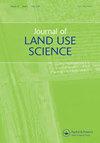确定变化的驱动因素并预测现有农田未来的土地利用影响
IF 3.3
4区 环境科学与生态学
Q1 AGRICULTURE, MULTIDISCIPLINARY
引用次数: 2
摘要
越来越多的人认为,全球粮食系统需要进行重大变革,以确保持续的粮食安全和阻止环境退化。这种努力必须包括对现有农场景观进行更可持续的管理。在这里,我们研究了加利福尼亚州克恩县种植的13种作物商品之间农田过渡的驱动因素。我们使用2002年至2018年的观测数据对作物选择的多项逻辑回归模型进行了参数化。然后,我们在三种情景下模拟了未来的作物选择,探讨了气候变化、水资源短缺和政策应对的后果,并预测了对三种农业生态系统压力(水利用、土壤侵蚀、农药使用)和三种农业生态系统服务(利润、营养和碳封存)的影响。农业土地利用转型对生物物理因素、利润和邻里效应尤为敏感。我们的研究结果表明,到2050年,气候变化可能导致景观级作物替代,并可能产生重大的社会生态后果。本文章由计算机程序翻译,如有差异,请以英文原文为准。
Identifying drivers of change and predicting future land-use impacts in established farmlands
ABSTRACT There is growing consensus that global food systems will need to undergo substantial transformations to ensure continued food security and to halt environmental degradation. Such efforts will have to include more sustainable management of existing farmscapes. Here, we examine drivers of cropland transitions between 13 crop commodities cultivated in Kern County, California. We parameterized multinomial logistic regression models of crop choices, using observed data from 2002 to 2018. We then simulated future crop choices under three scenarios exploring the consequences of climate change, water shortages and policy response, and projected impacts on three agroecosystem pressures (water-use, soil erosion, pesticide-use), and three agroecosystem services (profits, nutrition, and carbon sequestration). Agricultural land-use transitions were especially sensitive to biophysical factors, profits and neighborhood effects. Our results illustrate how climate change may lead to landscape-level crop replacement by 2050, with likely significant socio-ecological consequences.
求助全文
通过发布文献求助,成功后即可免费获取论文全文。
去求助
来源期刊

Journal of Land Use Science
Environmental Science-Management, Monitoring, Policy and Law
CiteScore
5.40
自引率
6.20%
发文量
26
期刊介绍:
The Journal of Land Use Science provides a central outlet for high-quality articles on theoretical and empirical aspects of land-use science at the interface of social and environmental systems. The Journal brings together an array of research perspectives at multiple temporal, spatial and social scales that contribute a better understanding of land-system dynamics and communicate scientific advances towards attaining land-system sustainability.
 求助内容:
求助内容: 应助结果提醒方式:
应助结果提醒方式:


